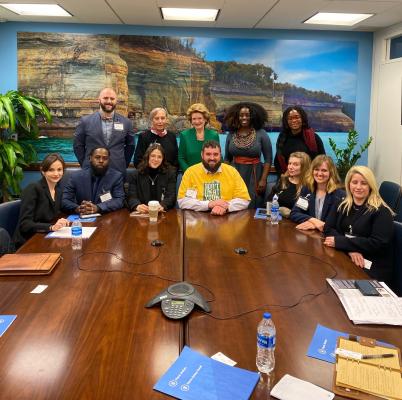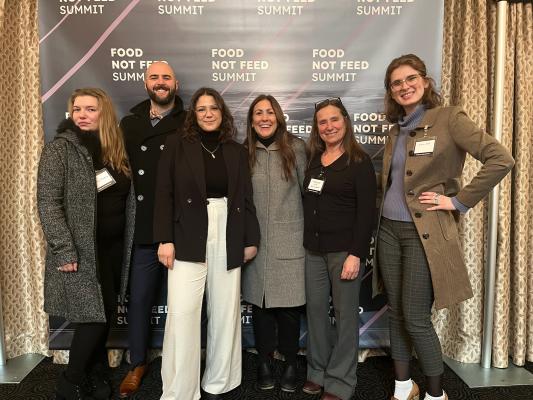
In February, students and faculty from the Center for Agriculture and Food Systems (CAFS) at Vermont Law and Graduate School (VLGS) joined a coalition of farm and food organizations in Washington, D.C. for the Food Not Feed Summit, an event focused on changing America’s agriculture policies.
Led by Farm Action, the summit aimed to educate policymakers and advocate for agricultural policy that shifts away from industrial livestock feed and toward an equitable food system focusing on fiber-rich foods and regeneratively raised livestock and poultry.
VLGS students Ema Makas, Travis Rosenbluth, Inés Hubaut, and Sierra Gold joined CAFS Director Laurie Beyranevand and Senior Staff Attorney Fran Miller on a visit to the Capitol event, participating in meetings with Congressional representatives, networking with food and policy professionals, and attending a panel moderated by CAFS alumna and ASPCA Director of Farm Animal Welfare Policy Kara Shannon.
The two-day event, held the week of President Biden’s 2023 State of the Union address and in advance of the 2023 Farm Bill reauthorization, convened representatives from food, farming, academia, health, conservation, and many more. Among the organizations in attendance was Farm Bill Law Enterprise, a national partnership of law schools that includes VLGS, which works toward Farm Bill reform.
“With the next farm bill, policymakers have an opportunity to shape a more sustainable and just food system. Prioritizing food over feed will help build climate resilience, protect farmer livelihoods, and ensure that our communities are nutritiously and adequately fed,” said Beyranevand of the summit’s goals.
Featuring panel discussions and a keynote address from Senator Cory Booker (D-NJ), the Summit also offered CAFS students the opportunity to meet directly with Congressional leaders. One notable meeting was with Debbie Stabenow (D-MI), Chairwoman of the Senate Committee on Agriculture, Nutrition, & Forestry, and CAFS alumna Lauren Wustenberg, who currently serves as Counsel on the Committee’s Majority staff. These visits allowed students, faculty, and partners to discuss the impact of Farm Bill policies on America’s food supply directly with policymakers and their staff.

CAFS exchange student Inés Hubaut, who is visiting from Paris Panthéon Sorbonne University, counts meeting Chairwoman Stabenow as one of the Summit’s biggest highlights.
“[Chairwoman Stabenow] shared a lot of our concerns and took the time to discuss them,” said Hubaut of the meeting. “The Summit was an extraordinary opportunity for us to advocate on Capitol Hill. It broadened our focus on the Farm Bill to include its economic, social, environmental, and health impacts.”
Making a case for food system change in front of some of the most influential lawmakers on agriculture law and policy consistently made an impression on many of the attending students.
“I find it surreal that we sat at the same conference table as Senator Debbie Stabenow,” said Ema Makas JD’24. “This trip was a wonderful opportunity to address important issues in the United States food system. The Food Not Feed Summit gave voice to not only policy professionals, but to real, local farmers that regularly live through many of these issues every day.”
The opportunity to connect directly with the law and policy system and learn on the ground is a key aspect of a VLGS education, and one that connects students with the lived experience of the people they represent. According to the Johns Hopkins Center for a Livable Future, 78% of Americans polled believe the American food system should prioritize healthy, sustainable food for people over feed for animals, a consensus that the Summit allowed students to bring directly to lawmakers.
“The Summit was an extraordinary opportunity for us to advocate on Capitol Hill. It broadened our focus on the Farm Bill to include its economic, social, environmental, and health impacts.”
–Inés Hubaut
Such direct advocacy with policymakers is a fundamental aspect of the legislative process, and one that is proven to produce results. According to Farm Action, a Farm Bill hearing following the Food Not Feed Summit included strong support for expanding crop insurance options beyond feed grains. Chairwoman Stabenow stressed at the hearing that she plans to focus on strengthening the crop insurance program to include specialty crop growers, organic farmers, and beginning operations during upcoming Farm Bill debates.
Travis Rosenbluth, a joint JD/MFALP student, zeroed in on the practice it takes to become an effective advocate for policy.
“My most pertinent takeaway [from the Summit] is that effective lobbying is understanding the fundamentals of the relationship you are entering into with the legislator or their staff. Understand what you are representing, understand the goals you want out of the meeting, make your asks succinctly, and don’t take any more time than necessary,” he said. “As with any ask, whether it is financial or legislative, make it as easy for them to say ‘yes.’”
As the next iteration of the Farm Bill finalizes this year, the conversation will continue to grow around the ways in which America makes use of its farmland—and students within the arena of food and agriculture law and policy at Vermont Law and Graduate School will feel their impact.